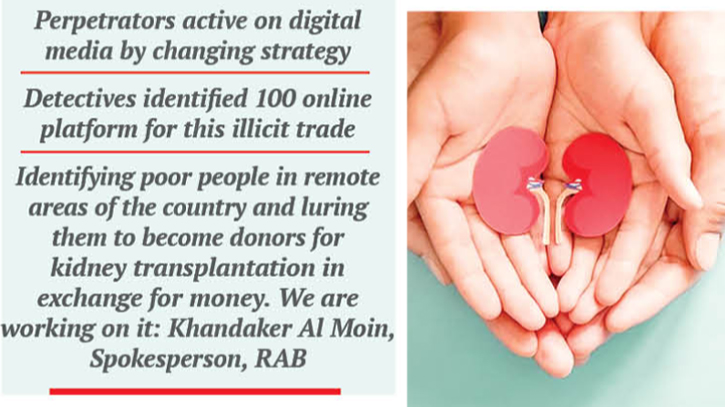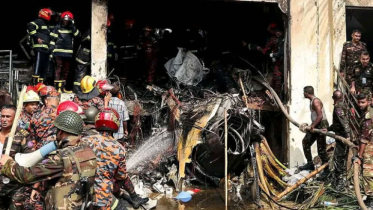
Photo : Messenger
Kidneys and livers are being openly advertised online for sale, which exposes a shocking reality that may seem unbelievable but is indeed true these days.
Such advertisements appear on various pages on popular social media platform Facebook, resembling a marketplace for selling human organs.
Disturbingly though, the individuals who responded to these ads by selling their kidneys did not receive the promised compensation; instead, they faced death threats.
The Rapid Action Battalion (RAB) has recently apprehended one such criminal gang involved in this illicit trade.
A post has been shared on a social media page named 'Kidney Network' on Facebook, seeking an A+ liver donor for urgent medical needs. The post specifies that potential donors must possess a passport and have a weight of 70 kg. Interested individuals are instructed to contact the page via the inbox feature. Similarly, a matching post has been posted by the North Bengal Kidney Patient Help Center on their Facebook page.
A concerning trend is observed on social media, where Facebook pages like 'Kidney Donor and Transplant Patient' attract potential donors by posting about liver donations, specifying blood group O positive. The process typically involves engaging individuals through inbox and mobile communication. Unfortunately, this seemingly altruistic act is tainted by an illicit practice where kidneys and livers are bought and sold through bargaining.
Regrettably, those who altruistically donate organs due to poverty do not benefit financially. Instead, the circle involved in these transactions collects a substantial sum of money from the recipient, exploiting the vulnerability of those in need of organ transplants.
In response to inquiries, RAB Legal and Media Wing Director Commander Khandaker Al Moin revealed that a concerning pattern has emerged where impoverished individuals from remote areas of the country are identified and enticed to become kidney donors in exchange for monetary compensation. The syndicate sends the donor to a neighboring country, specifically India, where the kidney transplantation procedure takes place.
Commander Khandaker Al Moin expressed that they have become aware of kidney trading has been occurring in various parts of the country, prompting an escalation of special surveillance through social media to suppress these illicit activities. This proactive approach underscores the importance of addressing organ trafficking and the exploitation of vulnerable individuals.
Commander Khandaker Moin also revealed that several members of these organ trafficking gangs have already been apprehended and brought under the law, and their operations are ongoing to catch the remaining culprits.
Following thorough investigations, it has been discovered that kidneys and livers are being bought and sold through various Facebook pages. Shockingly, there are at least hundreds of online platforms facilitating the sale of kidneys. In the past, organised gangs targeted impoverished areas in various districts, including Jaipurhat in the northern part of the country, for kidney and liver transplantations. However, there has been a shift in tactics, as syndicates now strategically exploit digital media rather than conducting on-site organ trading activities.
There is tangible evidence supporting these claims in recent law enforcement activities. The Rapid Action Battalion (RAB), the police's elite force, recently apprehended four members of a kidney and liver selling ring that was actively operating on the social media platform Facebook.
Following their arrest, law enforcement authorities have asserted that several such gangs are exploiting social media, including Facebook, as a secure platform for the illicit trade of kidneys and livers. Disturbingly, interactions between kidney buyers and sellers, including arguments, are taking place openly on social media platforms.
On a troubling note, a significant number of individuals who had previously sold their kidneys have succumbed to temptation and become kidney brokers. Instead of deterring others from engaging in such practices, these former kidney sellers are now actively encouraging others to sell their kidneys for financial gain, essentially acting as brokers for fraudulent activities.
According to intelligence officials, the online market for purchasing kidneys remains active. Even if members of these organ trafficking gangs are apprehended, they often secure bail and subsequently resume their criminal activities on a larger scale. It is disheartening to note that many individuals, unable to find alternative employment, are now working as sales representatives in the kidney trade.
Recently, the Rapid Action Battalion (RAB) successfully apprehended 10 individuals involved in a kidney trafficking ring that operated through social media. Following their arrest, RAB has revealed that the gang was conducting the illicit trade of kidneys online, spanning different parts of the country. Individuals in need of kidneys were reaching out to vendors, and unfortunately, the most adversely affected were those with low incomes. People in financial need contacted the provided phone numbers and, in desperation, sold their kidneys for monetary compensation.
Deputy Commissioner of DB at the Dhaka Metropolitan Police (DMP), Mashiur Rahman, recently promoted to the post of Additional DIG, has disclosed that approximately a hundred online kidney trading platforms have been identified. He highlighted that several pages on social media dedicated to kidney buying are being monitored by fraudsters located outside the country.
In response to this alarming trend, legal action is being taken against the identified platforms within the country. This proactive approach by law enforcement is crucial in addressing the growing issue of online kidney trafficking.
Intelligence sources have reported that over 50 Bangladeshis have been detained in the neighboring country of India in connection with the online buying and selling of kidneys. Additionally, within Bangladesh, law enforcement agencies have successfully apprehended approximately 30-40 members, including one of the main accused, involved in this organ trafficking gang.
As a result of these operations, many individuals are currently in jail, while others are out on bail.
Messenger/Fardin








